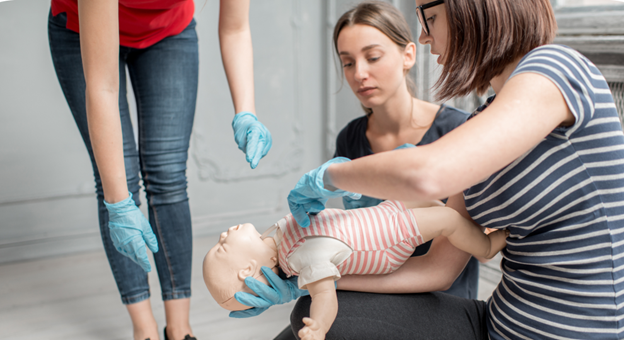Essential Tips for Nannies on Handling Emergencies with Confidence
As a nanny, ensuring the safety of the children in your care is your top priority. While most days are filled with joyful moments, emergencies can occur unexpectedly. Being prepared to handle such situations with confidence is crucial. Whether you’re managing a minor incident or a more serious issue, these essential tips will help you navigate challenges effectively, keeping children safe and earning trust as a nanny.
1. Stay Calm and Assess the Situation
Why It’s Important:
Emergencies require a level head. Staying calm not only helps you make quick, effective decisions but also reassures the children in your care. As a nanny, assessing the situation and determining immediate needs—such as whether to call for professional medical help or administer first aid—ensures safety and confidence in your caregiving.
What to Do:
● Take a deep breath and quickly assess the situation. The Determination of the emergency is immediate (e.g., choking, severe injury) or if there is time to evaluate further.
● Ensure that the children are safe from further harm. If necessary, remove them from danger before taking the next steps.
2. Prioritize Immediate Medical Attention
Why It’s Important:
In any emergency involving health or safety, getting professional medical help as soon as possible is critical.
What to Do:
● If a child is seriously injured or unresponsive, call 911 or your local emergency number immediately.
● Follow the dispatcher’s instructions carefully and do not hang up until they tell you to do so.
● While waiting for emergency responders, if you are trained in first aid or CPR, provide appropriate care to stabilize the child until help arrives.
3. Communicate with the Parents
Why It’s Important:
Clear, timely communication is essential for maintaining trust with families. As part of your nanny services, updating parents about emergencies in a calm, professional manner ensures they feel involved and reassured. This also strengthens your relationship with the family, showcasing your ability to handle tough situations responsibly.
What to Do:
● After ensuring the immediate safety of the child, contact the parents to inform them of the situation. Be calm and provide clear details about what happened and the steps you have taken.
● Keep the parents updated as the situation progresses, including when emergency responders arrive when the child’s condition changes.
4. Administer First Aid When Needed
Why It’s Important:
Knowing basic first aid can be life-saving in many situations. Whether it’s treating a minor cut or responding to a choking incident, first aid knowledge is essential.
What to Do:
● Always have a well-stocked first aid kit on hand and familiarize yourself with its contents.
● If a child has a minor injury, such as a cut or scrape, clean the wound and apply a bandage.
● In the case of choking, use age appropriate techniques (e.g., back blows and chest thrust for infants, Heimlich maneuver for older children) to clear the airway.
● For burns, cool the area under running water and avoid applying ice directly to the skin.
5. Know Your Child’s Medical History
Why It’s Important:
Understanding a child’s medical history, including allergies or chronic conditions, equips you to respond effectively during emergencies. This proactive approach aligns with professional childcare solutions, ensuring tailored care for each child and preventing avoidable risks.
What to Do:
● Before you start working with a family, request detailed information about the child’s medical history, including any allergies, asthma, or other conditions.
● Keep this information easily accessible, especially when leaving the house, such as during trips to the park or other outings.
● In case of a medical emergency related to a known condition (e.g., an allergic reaction), follow the parents’ instructions on how to administer medication, such as an EpiPen.
6. Prepare for Common Household Emergencies
Why It’s Important:
Being prepared for common household emergencies ensures that you can act quickly and effectively when they occur.
What to Do:
● Fire Safety: Know the location of fire extinguishers and how to use them. Practice an escape plan with the children and be familiar with all exits in the home.
● Water Safety: Never leave children unattended near water. If a child is submerged, remove them from the water immediately and perform CPR if necessary.
● Poisoning: Keep hazardous substances out of reach. If you suspect poisoning, contact Poison Control or emergency services immediately and follow their instructions.
7. Follow Up After the Emergency
Why It’s Important:
Once the situation is under control, following up with parents and providing emotional reassurance to children reinforces your role as a dependable caregiver. Reviewing the incident and refining your approach demonstrates your commitment to maintaining high standards in nanny care.
What to Do:
● After the situation is under control, provide comfort and reassurance to the children. Explain what happened in a way that is appropriate for their age and encourage them to talk about their feelings.
● If the child was injured or required medical attention, follow up with the parents to ensure proper aftercare is provided.
● Reflect on the emergency and consider any improvements that could be made by your response. This could involve updating first aid training, reviewing emergency procedures, or discussing the event with the parents.
8. Review and Practice Emergency Procedure
Why It’s Important:
Regularly reviewing and practicing emergency procedures ensures that you and the children know what to do if an emergency arises.
What to Do:
● Conduct regular drills for scenarios such as fire, severe weather, or intruder alerts. Practice these drills in a calm and reassuring manner to avoid frightening the children.
● Review the emergency contact list with the children, teaching older ones how to dial 911 and what information to provide.
● Ensure you know how to operate any emergency equipment in the home, such as smoke detectors, security systems, and first aid kits.
Importance of Renewing Your CPR Certification
Renewing your CPR certification every two years is not just a requirement—it’s an essential part of being a responsible caregiver. Staying up-to-date with CPR certification ensures you are well-prepared to respond to emergencies, such as choking, or cardiac arrest.
Over time, lifesaving techniques and guidelines evolve, and renewal courses provide you with the latest best practices and updates. Additionally, maintaining your certification demonstrates professionalism and reassures parents that their children are in safe, capable hands.
Make it a priority to schedule your CPR renewal before your certification expires, so you’re always ready to act confidently and effectively in any situation.
Conclusion
Handling emergencies is a critical part of a nanny’s role, requiring quick thinking, calmness, and preparedness. By following these steps and staying informed about emergency procedures, you can ensure that you are ready to protect and care for the children in your charge, no matter what happens. Remember, preparation is key to managing any effectively and keeping the children safe.
Are you ready to enhance your caregiving skills and provide top-notch care in emergencies? Explore our expert-led child care agency for the support you need to thrive. Check our services for more!







